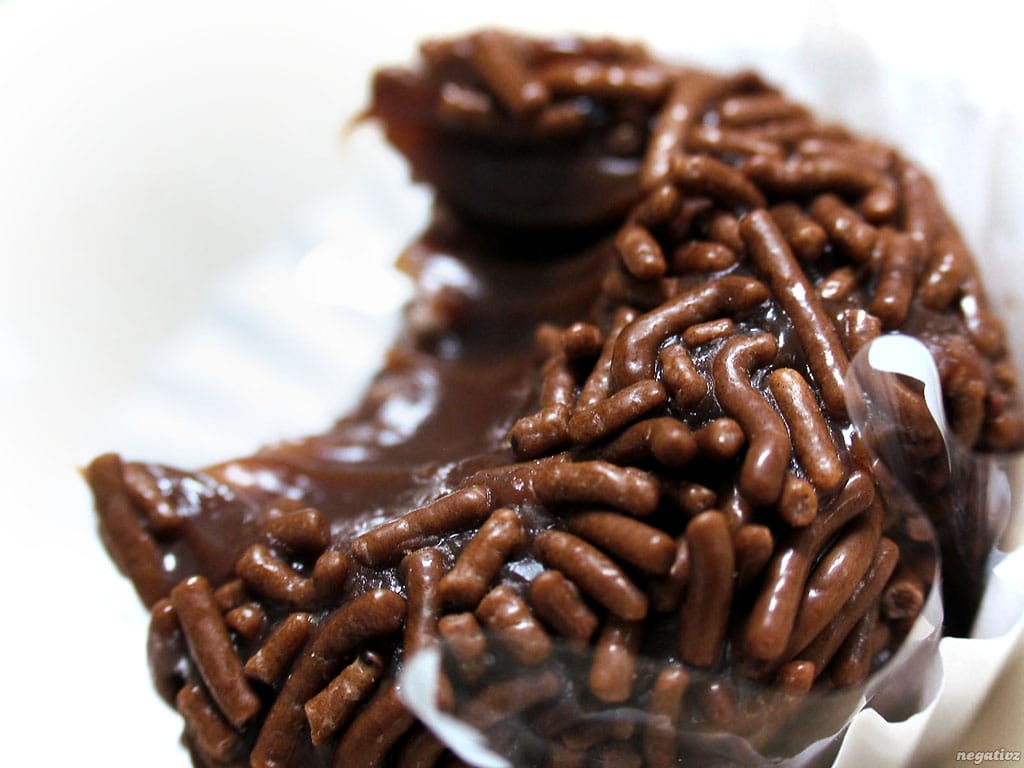Brigadeiro: A Deliciously Historical Story

I grew up in an immigrant Brazilian family living in the USA, and although I feel like my parents didn't pass down too much of their culture to me aside from a few recipes and typical Brazilian sweets, one thing above all has stayed with me as I've grown up. Behold the crown jewel of every Brazilian celebration: The Brigadeiro.

Who, or What is "Brigadeiro" anyways?
Yeah I'm pretty sure that photo isn't what you were expecting to see when I was talking about brigadeiros, and I wasn't expecting a politician either when I asked my family about the true story of my favorite birthday treat. The brigadeiro most people are familiar with is typically a Brazilian chocolate truffle of sorts made with condensed milk, butter, and cocoa powder heated in a deep saucepan until it reaches a certain consitency, usually to the point of being able to be rolled in a ball but with a texture that is still gooey when you chew it, then topped with chocolate sprinkles. I've also seen it be served in cups in a extremely viscous liquid form known as brigadeiro de colher (translated literally as spoon brigadeiro) or even in different flavors that omit cocoa powder and add in things like coconut (this variety is known as beijinhos, or kisses in English), pistachio or cashew (known as cajuzinhos).

How do I like my brigadeiros?
I really don't care-brigadeiros are always good. But the story of the brigadeiro isn't as simple as it may seem to many. Brigadeiro actually means "brigadier" in Portuguese, and in many countries this position refers to a senior officer who commands a brigade and is typically above the rank of colonel. The position itself arose in France in 1657 with the position "Brigadier des Armées du Roi" (Brigadier of the King's Armies) but found its way into many different militaries, including Brazil's.

The Brigadier
Alright let's get to the point. Who really is that random old dude I showed a picture of?
His name is Eduardo Gomes, nicknamed "Brigadeiro" for, as you may have guessed, being a Brigadier in the Brazilian Military.
Eduardo was born on the 16th of march 1896 in the city of Petrópolis in the state of Rio de Janeiro, otherwise just known as "Rio" (like the movie with that blue bird). Petrópolis was the de facto capital of Brazil (the de jure capital was the city of Rio de Janeiro.) where all of the fancy government officials lived. It was also where people with enough money went to to escape the yellow fever in the summer-another good reason for those moneybags and the big cheese to build their palaces there instead of Rio proper. When Eddie (I think I'll be calling him that from now on) grew up he attended the Military School of Realengo where the first military elite of Brazil originated from, and finished his education there in 1918 after which he was subsequently transferred to Curitiba, the capital of the state of Paraná in southern Brazil.

A Delinquent
After a few years of service in the military Eddie participated in a rebel military club (What a punk!) which was causing a bunch of ruckus after their club leader, ex-president and field marshal Hermes da Fonesca was imprisoned by the Brazilian government. The rebellion culminated in the Copacabana Fort Revolt on the fifth of July 1922 in Rio where about a couple thousand rebels were vastly outnumbered by the government-supporting Brazilian military and the revolt was put down. Consequentially, Eddie was arrested but was released in 1923.
You'd think that after rebelling and getting arrested he'd learn his lesson, but in 1924 he was arrested once more for rebellious activities and sent to a prison in Trinidade Island , 680 miles east off the coast of the Brazilian State of Espirito Santo (a state small in area about in the middle of the country) where he had to think about what he did wrong.
Our man made it out of there too a few years later and despite all odds still held an important role in the military, but it's safe to say Eddie never really learned his lesson, and was supporting revolts and overthrows until the late 60s when he left public life.
Why is Brigadeiro, Brigadeiro?
You'd (or at least I would) think that after spending most of his life trying to overthrow the government he would be ineligible to become president or something-but apparently this isn't the case, which can partly be attributed to his minor role in supporting the armed uprising that put Getúlio Vargas up as president in 1930, which earned him his military role back after much time in and out of prison. Turns out that he changed his mind and wasn't too fond of Vargas and Eddie became the opposition to supporters of former president Getúlio Vargas in December of 1945. Getúlio was a whole can of beans himself by the way, which is why I won't spend too long talking about him, but the role he has in this story is as Eddie's Enemy. Eddie's party, the UDN or National Democrats were anti-Varga, meaning they didn't support his populist policies. However, a number of other parties were more pro-Varga or at least not anti-Varga, including the PSD or the Social Democrats headed by Eurico Dutra who beat Eddie in his first election in 1945.
This was when the sweet we all know and love started to appear.
You see, this election was the first national one in Brazil in which women were allowed to vote, one supporter by the name of Heloísa Nabuco de Oliveira created a sweet. A sweet which was named after our beloved Eddie's nickname when he ran: Brigadeiro, because, well, he was a Brigadeiro. Called "doce de brigadeiro" (the brigadier's sweet), many of his female supporters sold the delicious confection on the streets of the capital and that is the tale of how the sweet spread across the world.

Eddie's Fate
As I said earlier he didn't win the 1945 presidential election. It also wasn't his last, he ran against the big bad Getúlio Vargas in 1950 and lost that one too. After this election he lost the motivation to run again, but you couldn't say the same for his hooliganism! Old Eddie still supported rebellions and was in favor for the ultimately successful military overthrow of João Goulart, who was president between 1961 and 1964, and became Minister of the Airforce afterwards. He stopped making public appearances in 1967, and passed away on June 13 1931.
A Sweet Legacy
Eddie's life choices may not have been the best, but they seemed to have worked out decently well for him-he didn't spend his entire life imprisoned, he wasn't executed, and he even ran for president! In my opinion though, the most important he left behind was the brigadeiro truffle which is enjoyed by millions every year.
